Various WWII Experiences
Palm Springs Air Museum Volunteers
Wayne Stump
B17 Pilot
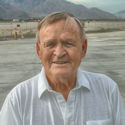
I was 21 when I piloted those missions. . . and my ball turret gunner was 17. We were young. We lost over 300 B-17s on takeoff during the war. When loaded, it was all those four engines could do to lift us into the air. If one engine coughed, the 17 was about to become another war statistic. It was required takeoff practice that the flight engineer place his hand over mine to make sure that those throttles would remain full forward until we were airborne.
Dick Paliafito
P51 Pilot
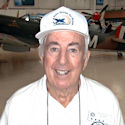
I was on a strafing mission to the Augsburg, Germany area, about 70 miles west of Stuttgart. That's when I was initiated into the nasty part of war--they shoot at you. We were about 25 feet above the ground and within the confines of a marshaling yard, the triple "A" [anti-aircraft] was very intense with the 20mm bursting all around the aircraft. While jinking my lady wildly, my left wing was vertical to the ground and I observed a large sheet of flame which was, sadly enough, my flight leader. That was the first time I was shot at and I've always thought that someone upstairs was watching over me, because even on succeeding strafing runs I was never hit, not even small arms.
Frank Pease
B24 Gunner
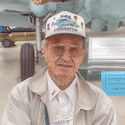
It was early in '44 and I was right waist gunner with the 389th Bomb Group. We were returning, unescorted, from a raid deep into Germany when 16 ME-109s hit us from above. I thought for sure we were gonners. That is a huge number of airplanes and the left waist gunner had counted every one of them. Somehow we all survived that first pass. Now those enemy fighters were reforming on the left side just out of our gun range for another pass. Our co-pilot was yelling on the radio, 'Bandits! Bandits! Bandits!' Before the Germans commenced that second pass, they spotted twin contrails of 13 P-38s high above us heading in our direction. The 16 "Bandits" dove away from us and we never saw them again. Gawd I love American fighter pilots! We would have been nailed for sure.
Vaughn Denning
Test Pilot
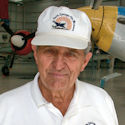
When the pilot had to bail out, he had to clear the elevator that was located a few yards directly behind him. I know of only two methods of bailing out of the P-38 and avoiding the elevator that were ever successful. One method was to roll the airplane upside down and trim the controls so the tail would go up when the pilot pushed himself downward out of the seat, and hopefully under the elevator. The other method involved carrying a ten-to-twelve foot long rope with knots tied about every foot. The pilot would tie one end of the rope to the airplane inside the cockpit. To bail out, he would lower himself over the wing's back edge by holding onto the knots in the rope. Hopefully, his weight should lower his body enough so he would pass under the P-38s elevator when he released the rope"
Jeff Arnett
C46 Pilot
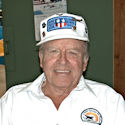
The second bomb had just been dropped on Nagasaki but the Japanese had not yet surrendered. We were taking a C-46 laden with medical supplies to Shanghai for our POWs and had made three passes over the city dropping leaflets announcing our intentions. Upon landing, the Japanese Army met us with guns and held us up at the airport for two hours while our status was determined. Finally the Swiss Consular people interviened and took us to their quarters where we spent the night. The next day, the Japanese formally announced their surrender and we got about our business. During this same time, a C-46 faired less well in Canton where they were interned in a Japanese prison but were released the following day to complete their life-saving mission.
Bob Good
P47 Pilot
I had just transferred from P-38s to the P-47 in the late spring of 1945. By then the German Luftwaffe consisted mostly of very inexperienced pilots with few hours. At the time, I had about five hours in the "Jug" as P-47s were called and was not yet accustomed to the range of my guns. I pulled toward an ME109 and fired but had not closed sufficiently to have him in range. It didn't seem to matter to that young pilot however, he bailed out before I got any closer. I got credit for the kill.
Karl Eichner
German Youth 88 Gunner
At 15 1/2 years of age, we attended school in the morning and manned the guns in the afternoon. We lived at the 88 battery sites which were not too far from my home south of Munich. A year and a half later the war ended. I was in the hospital when the Americans came. By this time, I had been inducted into the Wermacht (Army). Having recovered sufficiently in the hospital, I wanted to go home. Had the Americans known I was army, I would have been held longer for interrogation and clearance, so I destroyed my army papers and claimed to be a civilian. They believed me and allowed me to walk out of the hospital.

|